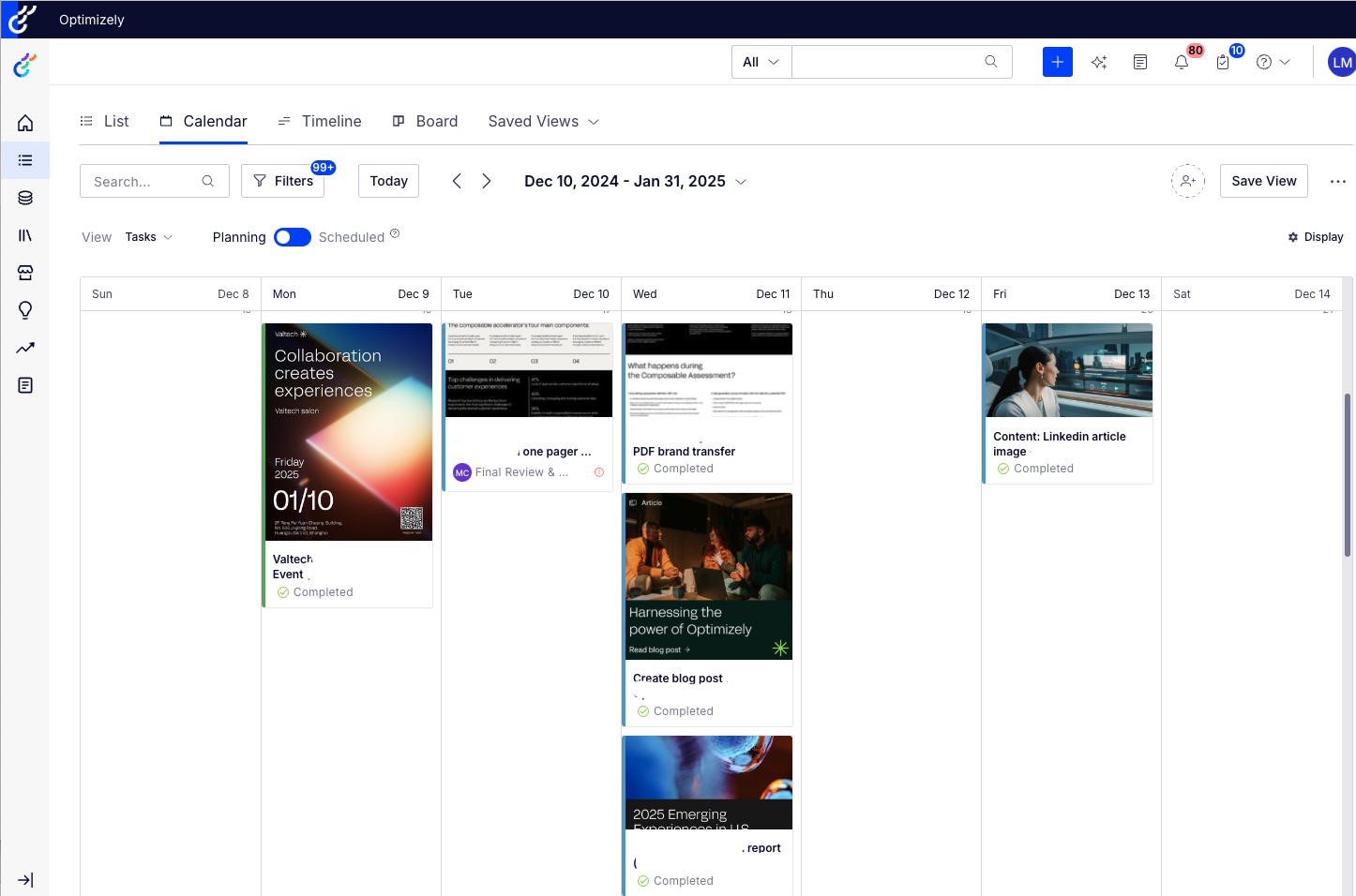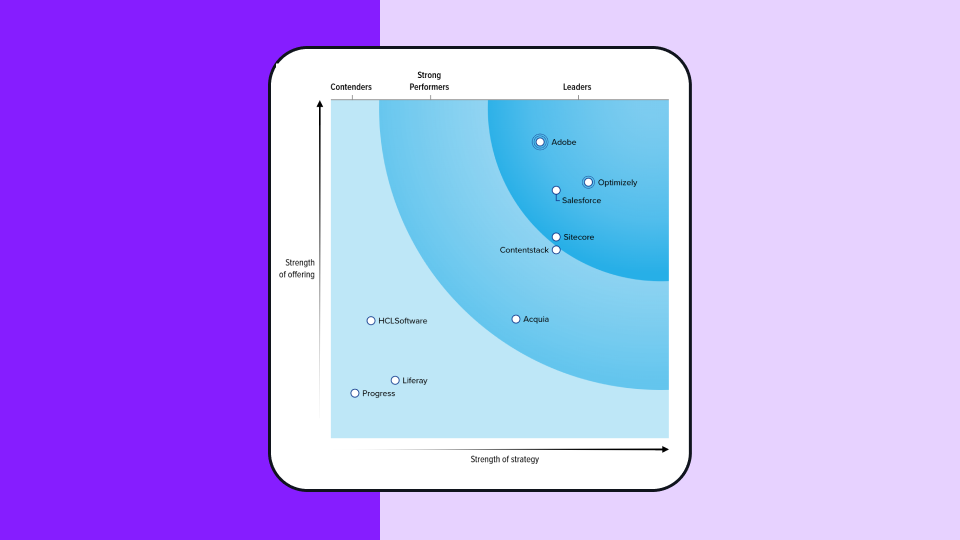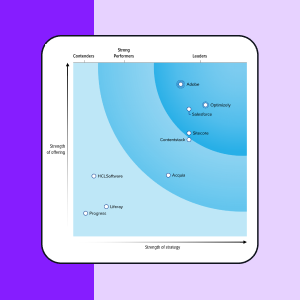Content hub software
What is content hub software?
Content hub software is a centralized digital platform that allows users to store, organize, manage, and distribute digital content assets across a variety of publishing channels and outlets. Think of it as the backbone of your business' content strategy, standardizing all content for seamless omnichannel experiences. But today's best content hubs do more than just organize — they think.
With AI powering the next generation of content hubs, these platforms are evolving from static repositories into intelligent systems that recommend, create, and optimize content in real-time. AI-powered content hubs make it easier to:
- Scale content operations
- Personalize digital experiences
- Maximize the impact of every asset
What does content hub software do?
Content hub software acts as a connective layer between your content and the systems that use it — your content management system (CMS), content marketing platform (CMP), customer relationship management (CRM), digital experience platform (DXP), digital asset management (DAM), and more.
And they've become easier than ever to implement. Many content hubs run off headless CMS's and no longer require dedicated development resources to operate.
Key functions of content hub software include:
- Centralizing all digital content (across formats, teams, and tools)
- Streamlining content creation, review, and approval workflows
- Enabling consistent omnichannel publishing and personalization
- Connecting upstream planning and downstream performance data
Think of it as your content’s operating system.
Content hub software is modular and scalable by design
Content hub software works a lot like Legos. Some content hubs are simply buckets full of various, generic blocks that you can build to whatever specifications you see fit. Others are more structured and come with custom pieces that make construction much simpler.
The software APIs are designed to integrate and grow with your company's existing software solutions and marketing needs. The software should arrive as a blank slate and be capable of centralizing content from all types of software solutions in a flash.
As an API-based solution, content hub software should be built for speed and fluidity. It can adapt to the speed at which your business grows, easily integrating into new platforms, software solutions, or team workflows.
How AI is changing the game for content hub software
Traditional content hubs focused on structure, workflows, and storage. But AI has flipped the script, turning them into dynamic engines for insight, automation, and performance. Here’s how:
-
Personalized content recommendations
AI analyzes real-time user behavior, intent signals, and historical data to surface the right content at the right time. This is what users want to see and typically results in higher engagement rates and more delightful experiences. -
Automated content creation and curation
Need blog outlines, meta descriptions, or content suggestions based on campaign goals? AI can help generate content drafts, fill content gaps, and even curate relevant content from your own archives or external sources.
Explore how AI changes content creation → -
Smarter performance insights
AI helps marketers see what’s working (and what’s not) faster. By analyzing performance patterns across content types and audiences, AI tools can recommend what to double down on and what to retire — even suggesting A/B tests to optimize future pieces.
See how AI-powered experimentation works → -
Better search and content discovery
AI-enhanced search helps teams find what they need — by topic, intent, or semantic context — not just keywords. It’s like going from Ctrl+F to Google Search, but inside your own content hub.
Real world results
Optimizely customers like Valtech are already using AI-powered content hubs to transform global content.
By centralizing content and streamlining workflows, Optimizely Content Marketing Platform (CMP) helped them scale their efforts and create over 300 content pieces in 2024 alone — no sweat. When Valtech acquired Kin+Carta, CMP made sure everything stayed on-brand by giving 170+ content items a quick refresh. They also pulled off over 200 projects and nearly 900 tasks, all with ease. The result? A marketing team that moves faster, works smarter, and delivers high-quality, on-brand content every time.

From centralized planning to AI-enhanced delivery, brands are saving time, reducing costs, and creating more personalized experiences — without blowing up their stack.
Five key benefits of using AI-powered content hub software
Content hub software ensures your content is reliable and ready to be used, no matter how fast your company grows or what software is used. And now, with AI-powered capabilities, it’s even easier to stay ahead of the curve. Here are five key benefits to adopting content hub software.
-
Integrate all content from existing sources — forever
Digital marketing is complex.
- Marketing and sales teams may use different software and workflows to complete similar tasks
- Vendors and software solutions are constantly evolving
- The tools that are required today will be deprecated at some point in the future, instilling another round of workflow and content migration upheaval
Content hub software integrates all of your digital content, regardless of file type, from all of your teams. Once centralized, your content can be exported via API into whatever channels you need, using whatever customer experience software your company decides to use — today or tomorrow.
-
Consolidate and centralize content across the company
Effective marketing requires backing up and syncing updated digital content across all channels. However, it is nearly impossible to keep content perfectly synced given the myriad tools being used by various teams.
AI-powered content hubs can streamline this process, automatically identifying and removing redundancies and out-of-sync versions. Migration can be phased, and the result is a single, reliable source of content.
-
Sync omnichannel content — painlessly
Different marketing channels often require different software solutions. Your content needs to remain accessible to all of your collaborators no matter the channel.
The same content can be exported to nearly any software solution you need using content hub software. Everything is synced from the hub. No need to worry about manually, or even automatically, updating content across channels when changes are made. The repository's content is universal. -
Turbo boost time to market
Have a new product or service idea to capitalize on, but time to market is key?
Content hubs allow you to focus on developing product, service or software independently of content. Once your new augmented-reality app ad or drip campaign is developed, your existing content is waiting and primed for delivery. Content hub software facilitates experimentation.
-
Optimize internal efficiency
Content hub software plays well with other software — CMSs, DAMs and production tools. It is a backend overlay, comprised of a flexible API that evolves with your company's needs. It’s scalable, meaning you can replace tools that no longer fit your workflow without disrupting your content operations. Sync omnichannel content — painlessly
How to choose the right content hub software
Need a handy little checklist on what to look for when evaluating content hub software solutions? Lucky for you, we've got you covered:
- AI capabilities: Can it help automate creation, personalize content, or improve performance?
- Integration-ready: Will it plug into current tools and workflows?
- Scalability: Will it grow with your team and your tech stack?
- Usability: Is it built for marketers, not just developers?
- Support and innovation: Is the platform keeping pace with how marketing is evolving?
Choosing the right content hub software is a key step in future-proofing your content strategy. Look for a solution that supports not only your current needs but also your future goals — one that makes your marketing team's life easier, integrates seamlessly into your existing tech stack, and adapts to the latest innovations in the world of content.
Optimizely: Your AI-powered content hub software solution
Optimizely powers the content hub experience through our Content Marketing Platform (CMP) and Optimizely One, our composable digital experience platform.
Here’s how we help:
- Create once, publish everywhere: Plan, produce, and distribute content across teams and channels from a single place.
-
AI-powered assistance: Generate content briefs, optimize SEO, or get smart recommendations using AI agents that work alongside your team.
-
Built-in experimentation: Test, learn, and iterate on your content in real time with native A/B testing and analytics.
-
Modular architecture: Integrate seamlessly with your existing CMS, DAM, CRM, or homegrown stack.
See how marketers use AI with Optimizely →
Content hub software solutions bolster digital growth and flexibility
Content hub software provides a streamlined approach to managing and distributing digital content across various channels, enhancing efficiency and collaboration within marketing teams. By centralizing content creation, management, and analytics, these platforms empower organizations to deliver consistent and engaging customer experiences.
Optimizely One excels as an AI-powered content hub solution by integrating content management, digital asset management, and marketing capabilities within a single platform. Its AI-driven workflows simplify content creation and optimization, while omnichannel delivery ensures that your messaging reaches audiences wherever they are.
FAQ: AI-powered Content Hubs
Does my content hub software need to be AI-powered?
Short answer: no. But understand that, at some point, it will need to be. So, are you ready to incur additional costs down the road or hope that your current solution builds out its own AI functionality? Are you ready to put in more manual work than may be required? If you answered no to these, it’s probably best to consider content hub software with built-in AI.
What are the benefits of AI-powered content hubs?
AI-powered content hubs automate content creation, optimize workflows, enhance personalization, and provide smarter insights to improve digital marketing performance.
How does AI help with content creation?
AI can generate first drafts, suggest headlines, rewrite content in your brand voice, and analyze which formats work best—making content production faster and more strategic.
Is content hub software only for marketers?
No—while marketers are the primary users, product teams, eCommerce managers, and even customer support teams benefit from using centralized, AI-powered content hubs.
What makes Optimizely’s content hub different?
Optimizely combines AI, experimentation, and orchestration into a single, connected platform—so you can manage content and optimize it across the entire digital journey.

